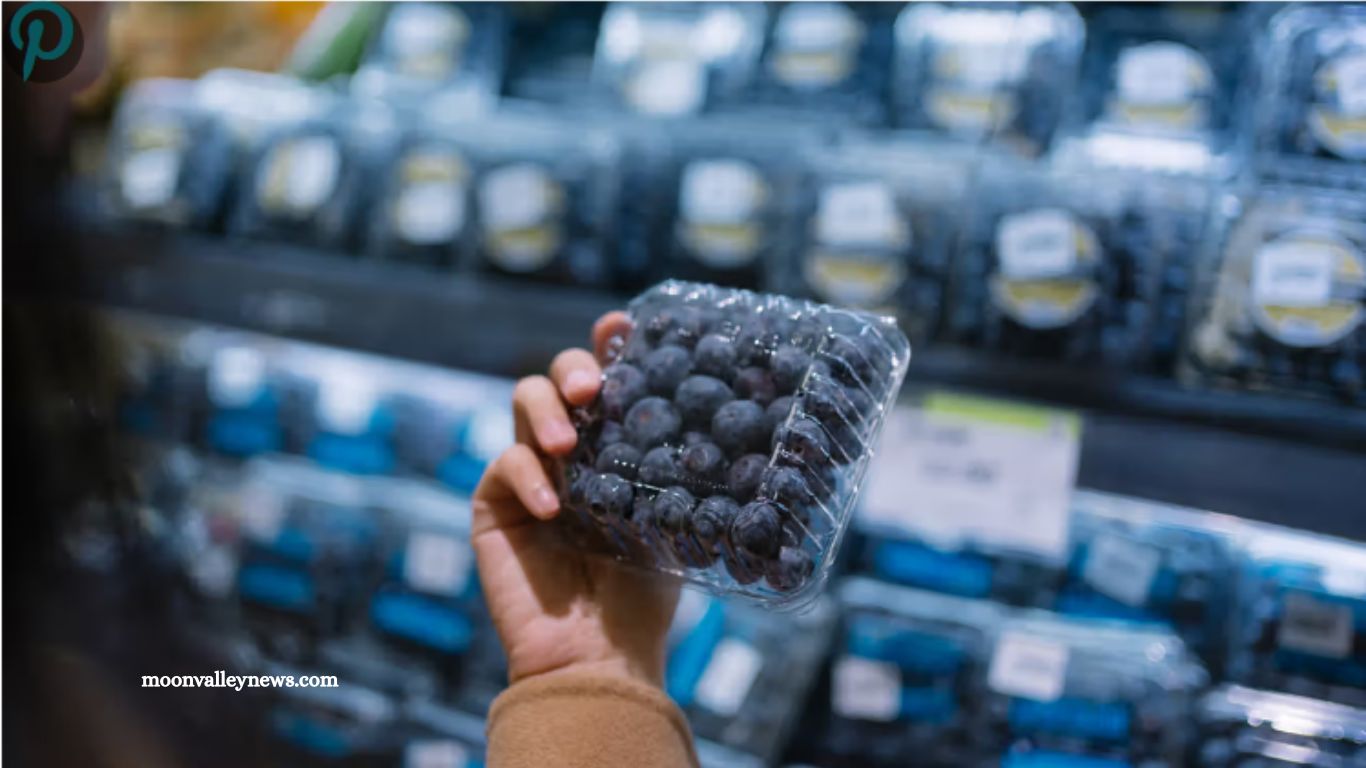The U.S. Food and Drug Administration (FDA) has issued its highest-level risk warning concerning a voluntary recall of hundreds of boxes of organic blueberries manufactured by Alma Pak International LLC, a Georgia-based food producer. This recall follows the detection of Listeria monocytogenes in two specific lots of the product.
Alma Pak initiated the recall on June 9 after routine testing revealed the presence of Listeria monocytogenes in Lot numbers 13325 G1060 and 13325 G1096. Approximately 400 boxes, each weighing 30 pounds, were primarily shipped to a single customer in North Carolina.
On July 1, the FDA classified the recall as Class 1—the most serious category—indicating a reasonable probability that exposure to the contaminated product could cause severe health consequences or death.
Read More: How the Internet We Know Is Changing Forever
Listeria infections can range from mild symptoms to life-threatening illness, particularly affecting vulnerable populations such as pregnant women, newborns, and those with weakened immune systems. Anyone suspecting exposure to contaminated food should seek immediate medical attention.
Although Healthline was unable to obtain a direct comment from Alma Pak, the company told Newsweek that the affected products were fully recovered before reaching retail shelves, ensuring no consumer exposure or public health risk.
In a statement, Alma Pak emphasized its commitment to food safety: “We have implemented additional corrective actions and preventive controls to enhance our already rigorous safety protocols. All products undergo comprehensive testing alongside a robust environmental monitoring program. Following the incident, intensified vector sampling was conducted, confirming that all subsequent samples tested negative for Listeria monocytogenes. These measures reaffirm the effectiveness of our food safety systems.”
What to Know About Listeria
Listeria monocytogenes is a harmful bacterium that can contaminate food and cause a serious foodborne illness known as listeriosis. While some cases are mild, others can be severe or even life-threatening, especially for certain high-risk groups.
Common Symptoms of Mild Listeriosis
For many healthy individuals, symptoms may be mild and typically resolve within 1–3 days. These may include:
- Fever
- Nausea and vomiting
- Diarrhea
- Muscle aches
Severe Listeria Infections
In more serious cases, the infection can spread beyond the digestive tract, leading to dangerous complications such as:
- Headache and stiff neck
- Confusion or disorientation
- Loss of balance
- Convulsions (seizures)
High-Risk Populations
Severe listeriosis poses the greatest risk to:
- Pregnant individuals and their newborns
- Adults over the age of 65
- People with weakened immune systems (e.g., due to illness or medical treatment)
- Young infants
When to Seek Medical Attention
If you develop flu-like symptoms or any of the more serious signs listed above—especially after consuming food suspected of contamination—it’s crucial to contact a healthcare provider immediately. Early diagnosis and treatment can significantly reduce the risk of complications.
How Listeria Bacteria Grows
Despite the FDA’s recent high-level risk classification related to a blueberry recall, health experts emphasize that the public should not be alarmed. The risk of contracting Listeria monocytogenes from blueberries remains very low—especially with proper handling and storage.
“Blueberries are generally safe for consumption. While contamination can happen, it’s rare, and proper handling usually keeps the risk very low,”
— Michelle Routhenstein, MS, RD, Registered Dietitian, Entirely Nourished
Conditions That Support Listeria Growth
Listeria monocytogenes is a resilient bacterium capable of growing under conditions that typically inhibit other pathogens. It can contaminate food during the production process, especially when:
- Berries come into contact with contaminated water
- Dirty equipment or unclean surfaces are used during harvesting or packaging
- Cold chain storage is not properly maintained
- Workers do not follow proper hygiene protocols
Risk of Cross-Contamination
Routhenstein further explains that Listeria can spread through cross-contamination—a common risk in both food processing and home kitchens.
“Cross-contamination occurs when ready-to-eat foods come into contact with surfaces or equipment contaminated with the bacteria,” she said.
“For instance, using the same cutting board for raw meat and then for fruits or vegetables—without proper cleaning—can result in contamination and potential illness.”
Proper food safety practices, including thorough washing, sanitizing surfaces, and maintaining cold temperatures, are essential in minimizing the risk of listeria contamination in both industrial and home settings.
How to Lower Your Risk of Listeria
While the chances of contracting listeria from fresh fruits like blueberries are low, there are simple, effective steps you can take to further reduce your risk of contamination.
Wash Fresh Produce Thoroughly
Always rinse fruits under cold running water before preparing, cooking, or eating them. This helps remove surface bacteria, dirt, and pesticide residues.
Tip: For fruits with firm skins or rinds, such as apples or melons, use a produce brush to scrub the surface.
Practice Proper Storage
Keep fruits refrigerated to slow bacterial growth and maintain freshness. Make sure to:
- Store produce away from raw meats, seafood, and poultry
- Use clean containers that have been properly sanitized
Consume Within a Few Days
Fresh fruits should be eaten promptly—ideally within a few days of purchase—to minimize the chance of bacterial growth during storage.
Maintain Clean Handling Practices
“It’s also important to clean your hands, kitchen surfaces, and containers before and after handling fresh produce,”
— Michelle Routhenstein, MS, RD
- Wash hands with soap and water before and after handling food
- Sanitize cutting boards, knives, countertops, and storage containers regularly
By following these simple safety practices, you can enjoy fresh fruits like blueberries while minimizing your exposure to Listeria monocytogenes and other foodborne pathogens.
Frequently Asked Questions
What does the FDA’s highest-level warning mean?
The FDA’s Class 1 recall warning indicates a serious risk where the use of a product may cause severe health consequences or even death.
Why were the blueberries recalled?
Alma Pak International voluntarily recalled the blueberries after tests revealed contamination with Listeria monocytogenes, a harmful bacterium.
Were the contaminated blueberries sold to consumers?
No. According to the manufacturer, the affected products were recovered before reaching retail shelves, posing no risk to the public.
What is listeria, and why is it dangerous?
Listeria monocytogenes is a bacterium that can cause listeriosis—a serious infection that’s particularly dangerous for pregnant people, older adults, and those with weakened immune systems.
How can I protect myself from listeria?
Wash fruits thoroughly, store produce properly, avoid cross-contamination, and consume fresh items within a few days of purchase.
What should I do if I think I’ve eaten contaminated food?
Seek medical attention immediately if you experience symptoms such as fever, nausea, diarrhea, or confusion—especially if you’re in a high-risk group.
Can listeria grow in refrigerated foods?
Yes. Unlike many bacteria, Listeria monocytogenes can grow at refrigeration temperatures, which is why proper food handling and hygiene are critical.
Conclusion
While the recent Class 1 recall of organic blueberries underscores the seriousness of potential Listeria monocytogenes contamination, experts emphasize that the overall risk to consumers remains low—especially when proper food safety practices are followed. Alma Pak International’s swift action, along with the FDA’s oversight, highlights the importance of routine testing and strong preventive measures in the food supply chain.







